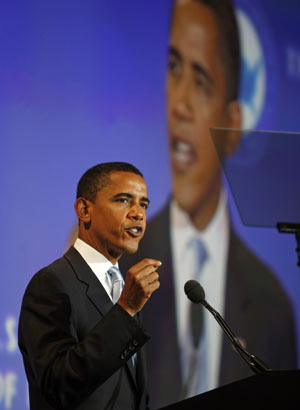US Democratic presidential candidate Barack Obama outlined his new tax on oil company on Sunday should he be elected president, as a way to strengthen government oversight of energy traders.
"My plan fully closes the Enron loophole and restores commonsense regulation as part of my broader plan to ease the burden for struggling families today while investing in a better future," the Illinois Senator said in a statement.

Democratic presidential candidate Senator Barack Obama (D-IL) speaks at the US Conference of Mayors in Miami, Florida June 21, 2008. (Xinhua/Reuters Photo)
The Enron, a Houston-based energy trading giant, collapsed in 2001 after it was discovered having vastly overstated its income.
"Enron loophole" was referred to a 2000 legislation that allowed unfettered oil trading on electronic markets, which was blamed for allowing speculators to run up the fuel cost by operating outside federal regulations and the skyrocketing oil prices as a result that reached 135 US dollars a barrel on Friday.
Obama blamed former Republican Senator from Texas Phil Gramm, who serves as an economic adviser of his presidential rival, John McCain, for inserting a provision into the bill in 2000 "at the behest of Enron lobbyists" that exempted some energy traders from government oversight.
According to Obama's campaign, the presumptive presidential nominee supports a tax on oil sales above 80 dollars a barrel that can be used to make homes more energy efficient and help families in need with their utility bills, as a way to reduce the "burden of rising prices".
However, McCain has rejected Obama's new tax proposal and said that he was open to oil company's excess profits.
McCain spokesman Tucker Bonds said that the Arizona Senator also supported efforts to close the loophole. He also noted the 2000 bill in question was signed into law by former Democratic President Bill Clinton.
"The fact that Barack Obama is attacking John McCain, despite McCain's leadership on the issue, shows that Barack Obama is driven by the partisan attacks that Americans are tired of," Bounds said.
Gramm also denied he had done anything with the writing of the provision on regulation of energy trading.
As the oil price hike drags the US economy that is haunted by Iraq war and subprime crisis into the worse, energy becomes one of the top concerns to American voters and focuses of debates between Obama and McCain.
Obama's campaign said that the proposal on the new tax is just a part of his broader energy strategy that aims at reducing oil consumption by 35 percent by 2030.
(Xinhua News Agency June 23, 2008)